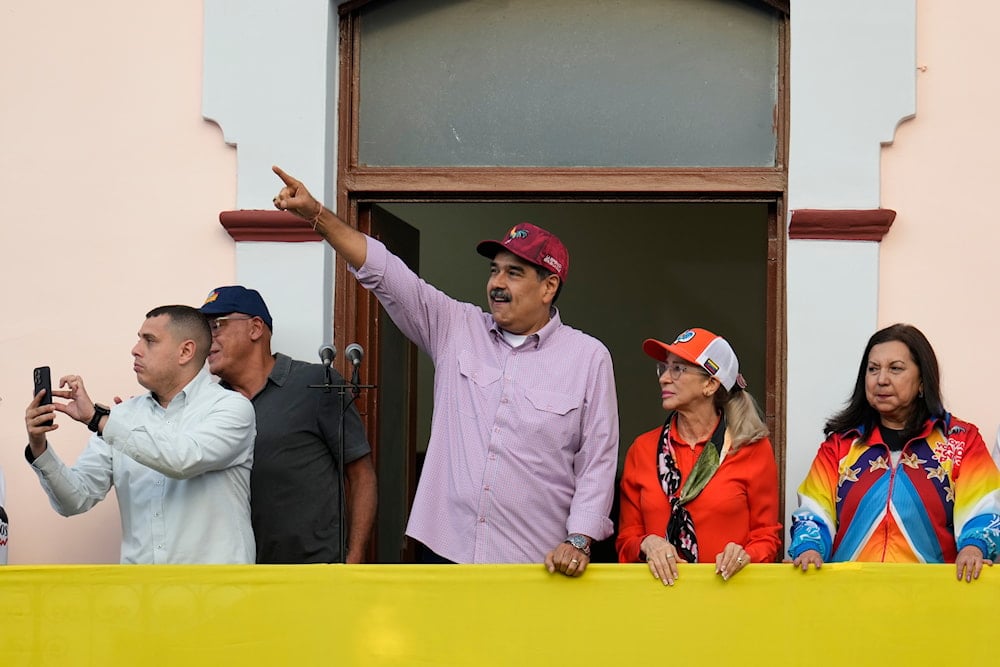Maduro hails municipal victory, says Venezuela leads in democracy
Venezuela’s ruling coalition secures 285 out of 335 mayoralties as officials tout rising voter turnout, grassroots participation, and rejection of opposition agendas.
-

Venezuela's President Nicolas Maduro addresses supporters during an event marking the anniversary of his disputed re-election and the 71st birthday of late President Hugo Chavez, in Caracas, Venezuela, Monday, July 28, 2025 (AP)
Venezuelan President Nicolas Maduro has hailed a sweeping electoral victory for the Chavista movement in the country’s July 27 municipal elections, declaring Venezuela “the most democratic and participatory country in the world.”
Speaking from the People’s Balcony at the Miraflores Presidential Palace, Maduro addressed jubilant supporters gathered to commemorate the 71st birthday of late President Hugo Chavez and the first anniversary of his re-election. The Venezuelan leader announced that the ruling coalition would now govern 85% of the country’s municipalities.
“Let this be a message to those who must learn to respect us,” Maduro said in a pointed statement directed at opposition factions and foreign critics. “We are the force of truth, of an empowered people. We are the children of Bolivar and Chavez.”
Maduro emphasized that the government had consistently upheld constitutional procedures, conducting seven rounds of municipal elections since 2000, in addition to numerous regional and national votes.
“These victories came despite enormous obstacles, economic sanctions, pandemics, assassination plots, sabotage, and imperialist persecution,” he stressed, framing the results as a testament to the resilience of the Venezuelan people and their democratic institutions.
The president also took aim at international media outlets like CNN, accusing them of distorting Venezuela’s political reality. “Nothing they say is true here. We don’t tolerate lies,” he declared. “When elections are necessary, we hold them. We fear no one. They have never been able to stop us, and they never will.”
Chavista coalition secures 285 of 335 mayorships
Jorge Rodriguez, head of the VEN25+ Campaign Command, reinforced Maduro’s message during a press briefing on July 28. He announced that the Great Patriotic Pole Simón Bolívar (GPPSB) coalition had won 285 out of 335 mayoralties nationwide, an overwhelming 85% majority.
Among the most significant victories was Petare, the largest neighborhood in Latin America, located in Miranda state’s Sucre municipality. Rodriguez also confirmed that the coalition secured 23 of Venezuela’s 24 state capitals and received 86.4% of the vote in Caracas alone.
Describing the results as a “resounding rejection of fascism and extremist politics,” Rodriguez said the outcome should serve as a warning to opposition leaders to take note of the people's will. He emphasized that Venezuelans had chosen concrete solutions over “empty slogans” and had rejected destabilization efforts, foreign intervention, and unconstitutional maneuvers.
Increased voter turnout and communal participation
Rodriguez noted a noticeable increase in voter turnout, rising from 41.67% in the previous cycle to 44%, an addition of nearly 300,000 voters. He attributed the uptick to growing confidence in Venezuela’s electoral system and to the public’s renewed interest in local governance.
“The people voted not for rhetoric, but for real proposals,” Rodríguez emphasized. “They chose peace, stability, and development.”
He also reaffirmed the Bolivarian government’s commitment to strengthening participatory democracy through communal governance initiatives. Highlighting the recent Youth Projects Popular Consultation, Rodríguez revealed that 80% of proposals had already been logged with the National Electoral Council (CNE), despite the process being conducted manually.
Looking ahead, Rodriguez predicted a new phase in Venezuela’s democratic model—one rooted in direct consultation and collective decision-making. “This is the future of governance in our country,” he concluded, “where the people lead and the state follows their voice.”

 3 Min Read
3 Min Read










